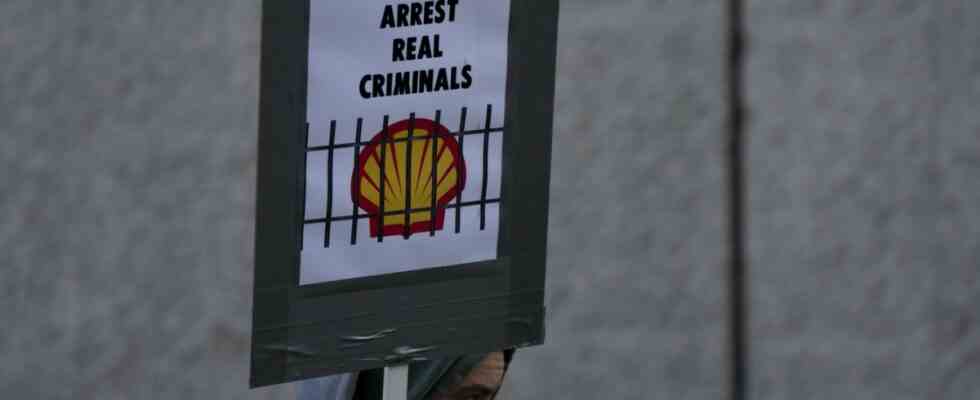It’s against the big CO₂ slingshots, against car manufacturers and energy companies. Climate protectors want to get to the root of the problem, which is why proceedings against commercial enterprises have increasingly come into focus for some time. Climate protection activists want to fight the early end of combustion engines and the reduction of CO₂ by means of a civil lawsuit. In the Netherlands, a lawsuit against Shell two years ago was successful, but in Germany plaintiffs are still waiting for a breakthrough; Both BMW and Mercedes-Benz won their lawsuits in the first instance. But now a new type of lawsuit is coming into focus, which could still develop considerable potential: Shareholders sue board members for sustainable management.
The environmental organization Client Earth in London has just brought such a lawsuit against Shell. Eleven Shell directors have failed to integrate the “material and foreseeable” risks into their strategy, which requires a move away from fossil fuels and towards the reduction targets of the Paris Agreement. Client Earth complained that the board of directors had violated its legal obligations.
They fight from within
Unlike activists and organic farmers who want to assert claims against big emitters from the outside, Client Earth tries to do it from the inside: As a Shell shareholder, the organization can demand in its own right that the board of directors exercise the diligence that it takes to manage a large company . And in 2023, this not only includes profit and employee concerns, but also a real sustainability strategy, Client Earth believes.
Would that also be a strategy for German climate protectors? Unlike in the UK, shareholders in this country cannot sue the board directly unless they can get a majority together. Because according to German stock corporation law, the supervisory board is intended to act as a buffer between the board of directors and the shareholders. And a supervisory board doesn’t complain. It would be conceivable, however, as a shareholder to contest the discharge of the board of directors because they do not have enough focus on climate protection. So a lawsuit, so to speak, from behind through the chest in order to address sustainability and CO₂ reduction. “Such actions for annulment are primarily about symbolism,” says Marc-Philippe Weller, professor of law at the University of Heidelberg. “Because the board has to fear for its reputation, such lawsuits are not welcomed.”
The decisive question is, of course: Is there a legally tangible “duty of care” on the part of company management to protect the climate and comply with the Paris Agreement? Or is their obligation to the shareholders limited to increasing profits and share price in a very real capitalist manner? Climate protection for image cultivation, but not for the operative business?
In fact, the question of what goals a company should aim for is changing. For about 20 years now, socio-political purposes have been increasingly counted among the tasks of company management, Weller observes; corporate social responsibility that’s what the company says. The discussion about the gender quota on the board, but also the commitment to human rights in the supply chain law are characteristics of this development.
The duties of the boardroom will probably develop in the direction of climate protection
And where social responsibility finds its way, it is only a short way to climate protection. Weller is skeptical as to whether a hard, judicially enforceable executive board obligation to comply with the Paris Agreement can already be read from the German Stock Corporation Act. According to Section 93, the board of directors must exercise “the diligence of a prudent and conscientious manager”. That still sounds pretty general. But according to Weller’s assessment, the duties of the boardroom will probably develop in the direction of climate protection.
And at the latest with an EU directive, abbreviated to CSDD, the half-soft rules should become hard requirements. Because the directive Corporate sustainability due diligence, which is due to be passed before the end of this year, is intended to oblige companies to align their strategy with the Paris climate target, i.e. to limit global warming to almost 1.5 degrees. “As soon as this is implemented, the board of directors’ duty of care must also be based on it,” says Weller. And where there is an obligation, the chances of a lawsuit increase.
The same is happening with the reporting obligations of companies, here too an EU directive that has already been passed is driving change. According to this, from the coming financial year onwards, medium-sized companies with more than 250 employees will also have to give an account of how climate-friendly and environmentally friendly they operate.
So also an obligation, this time for transparency in terms of sustainability. Anyone who violates this must also expect shareholder lawsuits. Such procedures have a nudging effect, says Weller: “They initiate changes because otherwise the company could lose its reputation.”

